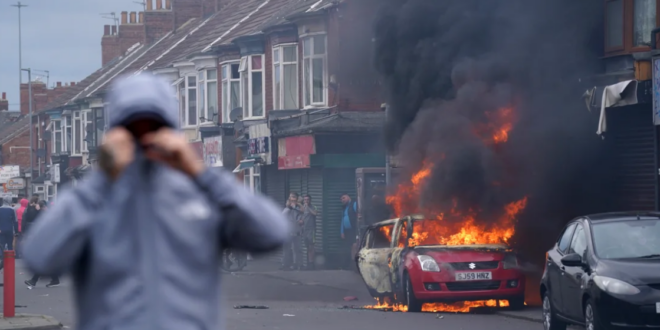Muhamad yehia
Riots have swept Britain over recent days, and more outbreaks of far-right, anti-immigrant violence are feared this week, leaving the new UK government scrambling to control the worst disorder in more than a decade.
Police officers were injured in Plymouth on Monday night as angry crowds descended on the coastal city in southwest England.
The latest outbreak of violence came after crowds of far-right agitators set fire to hotels housing asylum seekers over the weekend in two cities, leaving those inside trapped and terrified, while throngs of rioters in other cities damaged public buildings and clashed with police, throwing objects at officers and smashing their vehicles.Middlesbrough, England, was one of several UK towns and cities facing anti-immigration riots on Sunday.
RELATED ARTICLE
Nigeria, Australia and several other countries warn about travel to UK amid riots
Protests first broke out late last month, after an anti-immigrant misinformation campaign stoked outrage over a stabbing attack that left three children dead in Southport, northern England.
The UK’s Crown Prosecution Service said on Tuesday that prosecutors have already charged around 100 people over the violent unrest.
Prime Minister Keir Starmer chaired his first COBRA session on Monday morning – an emergency meeting of national agencies and branches of government – to discuss the response to the disorder, and Downing Street said he would host another on Tuesday evening. “This is not protest,” he said on Sunday. “It is organized, violent thuggery and it has no place on our streets, or online.”
The riots are the first crisis for Starmer, who became Britain’s leader a month ago after his Labour Party unseated the Conservatives in a general election. His next steps will be closely watched by lawmakers and the public.
Here’s what we know about the violence, and what may come next.
What happened on Britain’s streets?
Throughout Friday, Saturday and Sunday, violent protesters congregated in city and town centers across the UK, many of them apparently intent on clashing with police and causing havoc.
The gatherings ostensibly started as anti-immigration marches, organized on social media platforms like X and on WhatsApp and Telegram groups. They quickly turned disorderly and violent.
Protesters set ablaze two Holiday Inn hotels, in the town of Rotherham, northern England, and in Tamworth, in the Midlands, central England, that were believed to be housing asylum seekers awaiting a decision on their claims.
The Rotherham hotel at the time was “full of terrified residents and staff,” according to a statement by South Yorkshire Police Assistant Chief Constable Lindsey Butterfield.
A car burns during an anti-immigration protest in Middlesbrough on Sunday.
A car burns during an anti-immigration protest in Middlesbrough on Sunday. Owen Humphreys/PA
In Tamworth, rioters threw projectiles, smashed windows and started fires, injuring one police officer, according to local authorities. In Rotherham, they threw wooden planks, used fire extinguishers against officers, set fire to objects near the hotel, and smashed windows to gain entry to the building, police said.
Violence also took place in Sunderland, Middlesbrough, Stoke-on-Trent and several more cities, mostly across the Midlands and north of England. The Home Office said Sunday that mosques in the United Kingdom were being offered “greater protection with new emergency security.”
In all, more than 370 people were arrested following the weekend’s violence and the number was expected to rise “as forces continue to identify those involved and continue to apprehend those responsible,” the National Police Chiefs’ Council (NPCC), the UK’s national law enforcement body, said.
Many more suspects have yet to be identified, and authorities have pledged to use facial recognition and other technologies to track them down.
“People in this country have a right to be safe and yet, we’ve seen Muslim communities targeted, attacks on mosques, other minority communities singled out, Nazi salutes in the street, attacks on the police, wanton violence alongside racist rhetoric,” Starmer said at Downing Street.
“So no, I won’t shy away from calling it what it is: Far-right thuggery,” he added.What caused the unrest?
The violence was most immediately triggered by the stabbing of a number of children in Southport, northwest England, earlier in the week – a rare and shocking incident that left three young girls dead and the country reeling.
The far-right seized on and spread a wave of disinformation about that incident, including false claims the suspected attacker was an immigrant, to mobilize anti-Muslim and anti-immigrant protests. Police say the suspect was born in Britain.
But anti-migrant rhetoric has become increasingly widespread in Britain in recent years, with critics saying that trend has emboldened far-right sympathizers and contributed to scenes like those seen over the weekend.
Police and far-right protesters clash in Manchester.
 موقع وجه أفريقيا موقع وجه أفريقيا هو موقع مهتم بمتابعة التطورات في القارة الأفريقية
موقع وجه أفريقيا موقع وجه أفريقيا هو موقع مهتم بمتابعة التطورات في القارة الأفريقية



